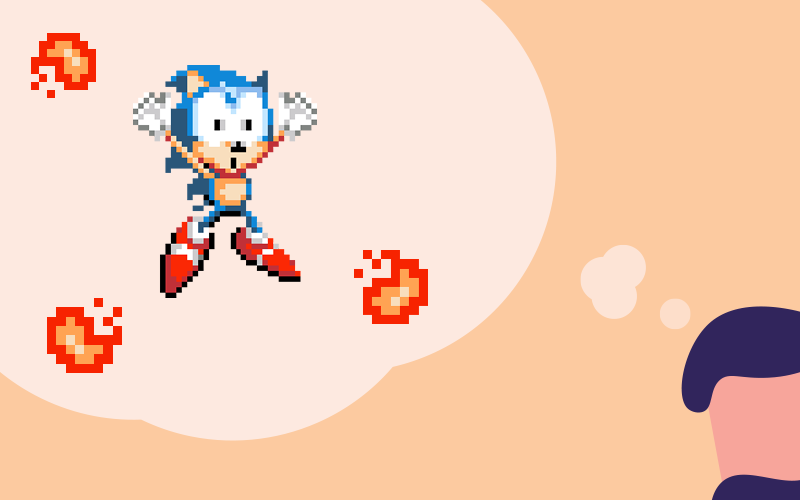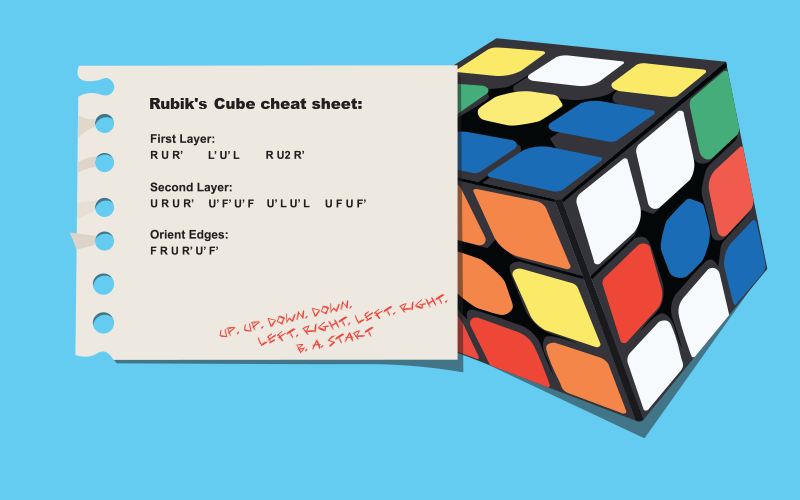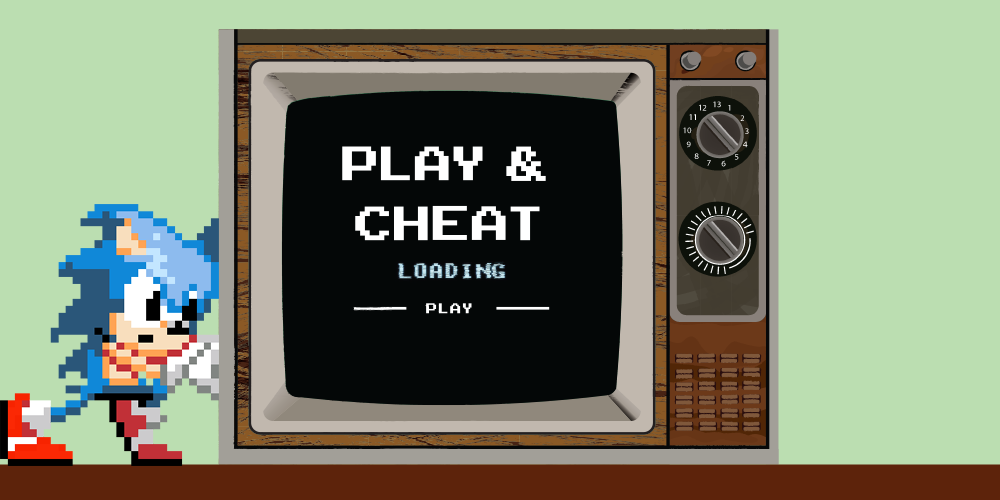When we were still married, my ex-wife bought me a Sega Genesis video game console for Christmas one year. A cartridge of the game Sonic the Hedgehog was included and I quickly became addicted. For those who haven’t experienced the unbridled joy of Sonic, imagine Super Mario Bros. except faster. The hedgehog you control wears red sneakers and, like many cartoon characters, nothing more. These help him go, sometimes becoming a blurred ball to drive home the point that this fucker is moving. Like Mario, he jumps over things with a magical bling sound, and, just like Mario, can be killed by flying fireballs, ugly falls onto pointy spikes, and spending too much time underwater. My ex-wife said, half-joking, that she worried she’d find me passed out in front of the TV one day, holding my breath just like Sonic who was trying to navigate a tricky underwater cave. She was right, I did sometimes hold my breath in solidarity. Whenever Sonic died, he would fling his hands up in the air and fall off the bottom of the screen and always I felt like tiny shavings of my soul went with him.
One night we were having a party and I was playing Sonic right up until the festivities began. At some point, my ex-wife reminded me to go pick up our friend William who didn’t drive. This was winter and the night was particularly dark. As I was driving to William’s, I noticed these headlights in my peripheral vision coming from a side street and I thought, Oh, these are the flying fireballs that I have to jump over at just the right moment — only for a split second, but yeah, I was driving a three-ton vehicle and mentally still back at home in the video game. The game became so all-encompassing that sometimes I’d even dream about it. According to my journal from 1994, I had one of those banal dreams where you run for a beer at the Super K-Mart and then hang around indefinitely waiting for friends who never arrive. While I was waiting in this dream, naturally, I played Sonic. I wasn’t even a dope-smoker in those days, but the dream was so vivid in all its multi-colored mundanity and boings and dings and ga-gangs that I made use of it in a story that I published called “Daydream Nation.”

I’ve loved video games since, as a child, I first stepped inside the flashing, hypnotizing cave known as the video arcade. I walked or biked to many a neighborhood pizzeria, convenience store, or strip mall gallery, but never spent more than a dollar or so at a time. Most of those visits involved socializing, watching some other kid better and more patient than me play for hours on a single quarter, or, when older, simply hanging out stoned. I’m an English professor now, and when I was given an iPad by my school a few years ago for work-related activities, I did the only sensible thing I could under the circumstances and immediately downloaded Angry Birds and Candy Crush. Angry Birds is wacky and fun and kind of addictive wherein one flings shrieking, whining birds through the air via slingshot; knocking over grunting pigs’ houses, giving them black eyes, pummeling them until they explode into a puff of feathers. On the face of it, Candy Crush with its two-dimensional rows of candy and psychotically happy music and psychedelic colors is as moronically simplistic as those word-find puzzles you see people doing on the subway, but that simplicity is deceptive. Candy Crush is like video game crack. I would play it all of the time. I played it instead of writing, instead of grading my student’s papers. It was better than masturbating. I had to eventually delete it from my machine because I had no self-restraint. Those are three months I’ll never get back. Don’t get me wrong, despite these lapses, I don’t think I’m a video game addict and definitely no geek. I wouldn’t know a Cetra even if it bit me on the ass. Video games to me, seem still, even in the 21st century, to be a petri dish of toxic masculinity. As a fiction writer who cares deeply about narrative point-of-view, there is something suspiciously sinister about the concept of the so-called first-person shooter game at this point in US history.
Most of the video games I was into involved a puzzle of some sort, problems to solve, they positioned you against the game and were pretty solitary endeavors. However, I also realize that there can be a social aspect to gaming. I suspect that the act of playing games, of competing against others in a common goal, reaches into something primal in humans, something not too far afield from tracking, killing, and eating wild animals. This is, perhaps, the same drive one finds in team sports. But sports, despite their popularity with people of all ages, ethnicities, classes, and spectrums of the political rainbow can be just as silly as video games.
I remarried and, a few years ago, when my father-in-law was in town we took him to see a Yankees game up in the Bronx. Since it’s a three-hour round trip on the train and a game lasts about three hours, we don’t do this often. I’m not a Yankees fan nor a Major League Baseball fan at all, but I loved every minute of it: drinking big beers and eating crappy hot dogs, shouting “Jeter!” along with the fans. It was even fun to join in the collective loathing, booing along with the crowd at the disgraced Alex Rodriguez who was undergoing steroid allegations at the time and whom the Yankees were trying to get rid of. I’m not sure how much of A-Rod’s woes were/are factual and how much conjecture, but it’s pretty well established these days that he was a cheater. I know there’s a lot of money involved in pro sports, but come on, really? How rich do you have to be, Alex? How famous, Tom Brady? I’m a runner these days, have run several half-marathons, but can’t imagine running, even walking, 26.2 miles. Google “marathon cheater” to get a whole array of “winners” who jumped into a cab or on a train, not satisfied simply to finish, but hungering for the prize money and all that glory. It seems so trivial.
At a point, you have to wonder what pleasure some guys and gals get from winning by cheating. I used a cheat sheet to solve my Rubik’s Cube in grade school and went online to cheat a screen in Angry Birds, but it’s not like I screwed over anyone else to do it. And so, I’m often briefly obsessed with watching the interviews of some of these disgraced characters when their cheating becomes public. Their statements all sound clear, reasonable, they display an appropriate amount of modesty and surprise at their downfall. They don’t seem like cocky bastards, the kind of people who don’t think they have to follow the same rules as everyone else. And when they can no longer deny it, when they’re backed into a corner, they can even seem appropriately embarrassed and contrite and maybe they’ll ask for just one more chance, just one more moment in the spotlight. You don’t understand how important this is to me, their eyes plead, looking very much like the two or three plagiarizers I catch and fail each year. Are you really going to let one mistake ruin my entire life? Perhaps Lance Armstrong in his interview with Oprah about cheating the Tour de France seven times was a little less modest than many, but most of them seem like nice guys and gals.

I’ve never been a professional sportsman of the legit or cheating kind though I did play team sports — basketball, soccer, track, cross country — during my school years. And I can understand the connections people make between video games and sport. Despite the depression I sometimes felt after a couple of hours in front of a video screen, I imagine that there is something crucial that gets worked out in playing games. A video game may not give its players fresh air or exercise and you can count me among the crowd that is skeptical that game-playing leads to skills valuable in future careers or that video gaming is a “sport.”
My definition of sport involves a bit more physical prowess than quick thumbs. I know that there is supposedly an endurance aspect to some video games, that particularly committed sportsmen wear diapers in order to excel, but despite that admirable dedication, I still don’t think gaming rises quite to the level of sport. Even golf, which our past president seemed to enjoy almost as much as Twitter and twice as much as governing, involves some kind of physical exertion — and I mean driving the ball 300 yards, not puttering around a golf course in a motorized cart. But video games — like baseball, biking, soccer, and basketball — have been discovered to be a “sport” that people will actually watch. And when people are willing to watch, when they’re willing to shell out the cash for a ticket, then advertisers get involved, corporate America (or corporate anywhere) wants to stick its fingers into the pie and take its juicy, drippy cut. Once that happens, there are cash prizes and after there’s money involved, then people want to win at all costs, even if that involves a little cheating. Of course, there’s the glory too. But when you’re a kid seeing how long a quarter will last in a console or you’re kicking a soccer ball with friends or you’re just throwing a ball up on the roof to see who will catch it when it rolls off, you’re doing it for the pure pleasure of doing it. You don’t expect a payday for playing and, as a result, it doesn’t make much sense to cheat. •




